|
|
|
|
| | HOME | AUDIOLIBROS | AMOR | ERÓTICA | HUMOR | INFANTIL | MISTERIO | POESÍA | NO FICCIÓN | BILINGUAL | VIDEOLIBROS | NOVEDADES | | |||||||||||||||
|
|
|
|
|||||||||||||
|
|||||||||||||||
|
"La señora en el espejo - The lady in the looking-glass" |
||||||
Biografía de Virginia Stephen Woolf, en Wikipedia |
||||||
|
||||||
Double-click any English word!
| ||
[ Descargar archivo mp3 ] 27:49
(Haga clic en la palabra deseada en Inglés para saber su significado y pronunciación)
| ||
LA SEÑORA EN EL ESPEJO
| THE LADY IN THE LOOKING-GLASS | |
UN REFLEJO
| A REFLECTION | |
| La gente no debiera dejar espejos colgados en sus habitaciones, tal como no debe dejar talonarios de cheques o cartas abiertas confesando un horrendo crimen. En aquella tarde de verano, una no podía dejar de mirar el alargado espejo que colgaba allí, afuera, en el vestíbulo. Las circunstancias así lo habían dispuesto. Desde las profundidades del diván en la sala de estar, se podía ver, en el reflejo del espejo italiano, no sólo la mesa con cubierta de mármol situada enfrente, sino también una parte del jardín, más allá. Se podía ver un sendero con alta hierba que se alejaba por entre parterres de altas flores, hasta que, en un recodo, el marco dorado lo cortaba. | People should not leave looking–glasses hanging in their rooms any more than they should leave open cheque books or letters confessing some hideous crime. One could not help looking, that summer afternoon, in the long glass that hung outside in the hall. Chance had so arranged it. From the depths of the sofa in the drawing–room one could see reflected in the Italian glass not only the marble–topped table opposite, but a stretch of the garden beyond. One could see a long grass path leading between banks of tall flowers until, slicing off an angle, the gold rim cut it off. | |
| La casa estaba vacía, y una se sentía, ya que era la única persona que se encontraba en la sala de estar, igual que uno de esos naturalistas que, cubiertos con hierbas y hojas, yacen observando a los más tímidos animales —tejones, nutrias, martín pescadores—, los cuales se mueven libremente, cual si no fueran observados. Aquel atardecer, la habitación estaba atestada de esos tímidos seres, de luz y sombras, con cortinas agitadas por el viento, pétalos cayendo —cosas que nunca ocurren, o eso parece, cuando alguien está mirando. La silenciosa y vieja estancia campestre, con sus alfombras y su hogar de piedra, con sus hundidas estanterías para libros, y sus cómodas laqueadas en rojo y oro, estaba llena de esos seres nocturnos. Se acercaban contoneándose, y cruzaban así el suelo, pisando delicadamente con los pies elevándose muy alto, y las colas extendidas en abanico, y picoteando significativamente, cual si hubieran sido cigüeñas o bandadas de pavos reales con la cola cubierta de velo de plata. Y también había sombríos matices y oscurecimientos, como si una sepia hubiera teñido bruscamente el aire con morado. Y el cuarto tenía sus pasiones, sus furias, sus envidias y sus penas cubriéndolo, nublándolo, igual que un humano. Nada seguía invariable siquiera durante dos segundos. | The house was empty, and one felt, since one was the only person in the drawing–room, like one of those naturalists who, covered with grass and leaves, lie watching the shyest animals—badgers, otters, kingfishersmoving about freely, themselves unseen. The room that afternoon was full of such shy creatures, lights and shadows, curtains blowing, petals falling—things that never happen, so it seems, if someone is looking. The quiet old country room with its rugs and stone chimney pieces, its sunken book–cases and red and gold lacquer cabinets, was full of such nocturnal creatures. They came pirouetting across the floor, stepping delicately with high–lifted feet and spread tails and pecking allusive beaks as if they had been cranes or flocks of elegant flamingoes whose pink was faded, or peacocks whose trains were veiled with silver. And there were obscure flushes and darkenings too, as if a cuttlefish had suddenly suffused the air with purple; and the room had its passions and rages and envies and sorrows coming over it and clouding it, like a human being. Nothing stayed the same for two seconds together. | |
| Pero, fuera, el espejo reflejaba la mesa del vestíbulo, los girasoles y el sendero del jardín, con tal precisión y fijeza que parecían allí contenidos, sin posibilidad de escapar, en su realidad. Constituía un extraño contraste; aquí todo cambiante, allá todo fijo. No se podía evitar que la vista saltara, para mirar lo uno y lo otro. Entre tanto, debido a que por el calor todas las ventanas y puertas estaban abiertas, se daba un perpetuo suspiro y cese del sonido, como la voz de lo transitorio y perecedero, parecía, yendo y viniendo como el aliento humano, en tanto que, en el espejo, las cosas habían dejado de alentar y se estaban quietas, en trance de inmortalidad. | But, outside, the looking–glass reflected the hall table, the sunflowers, the garden path so accurately and so fixedly that they seemed held there in their reality unescapably. It was a strange contrast—all changing here, all stillness there. One could not help looking from one to the other. Meanwhile, since all the doors and windows were open in the heat, there was a perpetual sighing and ceasing sound, the voice of the transient and the perishing, it seemed, coming and going like human breath, while in the looking–glass things had ceased to breathe and lay still in the trance of immortality. | |
| Hacía media hora que la dueña de la casa, Isabella Tyson, se había alejado por el sendero, con su fino vestido de verano, un cesto al brazo, y había desaparecido, cortada por el marco dorado del espejo. Cabía presumir que había ido al jardín bajo, para coger flores; o, lo que parecía más natural suponer, a coger algo leve, fantástico, con hojas, con lánguidos arrastres, como clemátides o uno de esos elegantes haces de convólvulos que se retuercen sobre sí mismos contra feos muros, y ofrecen aquí y allá el estallido de sus flores blancas y violetas. Parecía más propio de Isabella el fantástico y trémulo convólvulo que el erecto áster o la almidonada zinnia, o incluso sus propias rosas ardientes, encendidas como lámparas en lo alto de sus tallos. Esta comparación indicaba cuan poco, a pesar de los años transcurridos, una sabía de Isabella; por cuanto es imposible que una mujer de carne y hueso, sea quien sea, de unos cincuenta y cinco o sesenta años, sea, realmente, un ramo o un zarcillo. Estas comparaciones son peor que estériles y superficiales, son incluso crueles, por cuanto se interponen como el mismísimo convólvulo, temblorosas, entre los ojos y la verdad. Debe haber verdad; debe haber un muro. Sin embargo, no dejaba de ser raro que, después de haberla conocido durante tantos años, una no pudiera decir la verdad acerca de lo que Isabella era; una todavía componía frases como ésas, referentes a convólvulos y ásteres. En cuanto a los hechos, no cabía dudar de que era solterona, rica, que había comprado esta casa y que había adquirido con sus propias manos —a menudo en los más oscuros rincones del mundo y con grandes riesgos de venenosas picadas y orientales enfermedades— las alfombras, las sillas y los armarios que ahora vivían su nocturna vida ante los ojos de una. A veces parecía que estos objetos supieran acerca de ella más de lo que nosotros, que nos sentábamos en ellos, escribíamos en ellos y caminábamos, tan cuidadosamente, sobre ellos, teníamos derecho a saber. En cada uno de aquellos muebles había gran número de cajoncitos, y cada cajoncito, con casi total certeza, guardaba cartas, atadas con cintas en arqueados lazos, cubiertas con tallos de espliego y pétalos de rosa. Sí, ya que otra verdad —si es que una quería verdades— consistía en que Isabella había conocido a mucha gente, tenía muchos amigos; por lo que, si una tenía la audacia de abrir un cajón y leer sus cartas, hallaría los rastros de muchas agitaciones, de citas a las que acudir, de reproches por no haber acudido, largas cartas de intimidad y afecto, violentas cartas de celos y acusaciones, terribles palabras de separación para siempre —ya que todas esas visitas y compromisos a nada habían conducido—, es decir, Isabella no había contraído matrimonio, y sin embargo, a juzgar por la indiferencia de máscara de su cara, había vivido veinte veces más pasiones y experiencias que aquellos cuyos amores son pregonados para que todos sepan de ellos. Bajo la tensión de pensar en Isabella, aquella estancia se hizo más sombría y simbólica; los rincones parecían más oscuros, las patas de las sillas y de las mesas, más delicadas y jeroglíficas. | Half an hour ago the mistress of the house, Isabella Tyson, had gone down the grass path in her thin summer dress, carrying a basket, and had vanished, sliced off by the gilt rim of the looking–glass. She had gone presumably into the lower garden to pick flowers; or as it seemed more natural to suppose, to pick something light and fantastic and leafy and trailing, travellers’ joy, or one of those elegant sprays of convolvulus that twine round ugly walls and burst here and there into white and violet blossoms. She suggested the fantastic and the tremulous convolvulus rather than the upright aster, the starched zinnia, or her own burning roses alight like lamps on the straight posts of their rose trees. The comparison showed how very little, after all these years, one knew about her; for it is impossible that any woman of flesh and blood of fifty–five or sixty should be really a wreath or a tendril. Such comparisons are worse than idle and superficial—they are cruel even, for they come like the convolvulus itself trembling between one’s eyes and the truth. There must be truth; there must be a wall. Yet it was strange that after knowing her all these years one could not say what the truth about Isabella was; one still made up phrases like this about convolvulus and travellers’ joy. As for facts, it was a fact that she was a spinster; that she was rich; that she had bought this house and collected with her own hands—often in the most obscure corners of the world and at great risk from poisonous stings and Oriental diseases—the rugs, the chairs, the cabinets which now lived their nocturnal life before one’s eyes. Sometimes it seemed as if they knew more about her than we, who sat on them, wrote at them, and trod on them so care fully, were allowed to know. In each of these cabinets were many little drawers, and each almost certainly held letters, tied with bows of ribbon, sprinkled with sticks of lavender or rose leaves. For it was another fact—if facts were what one wanted—that Isabella had known many people, had had many friends; and thus if one had the audacity to open a drawer and read her letters, one would find the traces of many agitations, of appointments to meet, of upbraidings for not having met, long letters of intimacy and affection, violent letters of jealousy and reproach, terrible final words of parting—for all those interviews and assignations had led to nothing—that is, she had never married, and yet, judg ing from the mask–like indifference of her face, she had gone through twenty times more of passion and exper ience than those whose loves are trumpeted forth for all the world to hear. Under the stress of thinking about Isabella, her room became more shadowy and symbolic; the corners seemed darker, the legs of chairs and tables more spindly and hieroglyphic. | |
| De repente, estos reflejos terminaron violentamente, aunque sin producir sonido alguno. Una gran sombra negra se cernió sobre el espejo, lo borró todo, sembró la mesa con un montón de rectángulos de mármol veteados de rosa y gris, y se fue. Pero el cuadro quedó totalmente alterado. De momento quedó irreconocible, ilógico y totalmente desenfocado. Una no podía poner en relación aquellos rectángulos con propósito humano alguno. Y luego, poco a poco, cierto proceso lógico comenzó a afectar a aquellos rectángulos, comenzó a poner en ellos orden y sentido, y a situarlos en el marco de los normales aconteceres. Una se dio cuenta, por fin, de que se trataba meramente de cartas. El criado había traído el correo. | Suddenly these reflections were ended violently—and yet without a sound. A large black form loomed into the looking–glass; blotted out everything, strewed the table with a packet of marble tablets veined with pink and grey, and was gone. But the picture was entirely altered. For the moment it was unrecognizable and irrational and entirely out of focus. One could not relate these tablets to any human purpose. And then by degrees some logical process set to work on them and began ordering and arranging them and bringing them into the fold of common experience. One realized at last that they were merely letters. The man had brought the post. | |
| Reposaban en la mesa de mármol, todas ellas goteando, al principio, luz y color, crudos, no absorbidos. Y después fue extraño ver cómo quedaban incorporadas, dispuestas y armonizadas, cómo llegaban a formar parte del cuadro, y recibían el silencio y la inmortalidad que el espejo confería. Allí reposaban revestidas de una nueva realidad y un nuevo significado, y dotadas también de más peso, de modo que parecía se necesitara un escoplo para separarlas de la mesa. Y, tanto si se trataba de verdad como de fantasía, no parecía que fueran un puñado de cartas, sino que se hubieran transformado en tablas con la verdad eterna incisa en ellas; si una pudiera leerlas, una sabría todo lo que se podía saber acerca de Isabella, sí, y también acerca de la vida. Las páginas contenidas en aquellos sobres marmóreos forzosamente tenían que llevar profuso y profundamente hendido significado. Isabella entraría, las cogería, una a una, muy despacio, las abriría, y las leería cuidadosamente, una a una, y después, con un profundo suspiro de comprensión, como si hubiera visto el último fondo de todo, rasgaría los sobres en menudas porciones, ataría el montoncito de cartas, y las encerraría bajo llave en un cajón, decidida a ocultar lo que no deseaba se supiera. | There they lay on the marble–topped table, all dripping with light and colour at first and crude and unabsorbed. And then it was strange to see how they were drawn in and arranged and composed and made part of the picture and granted that stillness and immortality which the looking–glass conferred. They lay there invested with a new reality and significance and with a greater heaviness, too, as if it would have needed a chisel to dislodge them from the table. And, whether it was fancy or not, they seemed to have become not merely a handful of casual letters but to be tablets graven with eternal truth—if one could read them, one would know everything there was to be known about Isabella, yes, and about life, too. The pages inside those marble–looking envelopes must be cut deep and scored thick with meaning. Isabella would come in, and take them, one by one, very slowly, and open them, and read them carefully word by word, and then with a profound sigh of comprehension, as if she had seen to the bottom of everything, she would tear the envelopes to little bits and tie the letters together and lock the cabinet drawer in her determination to conceal what she did not wish to be known. | |
| Este pensamiento cumplió la función de estímulo. Isabella no quería que se supiera, pero no podía seguir saliéndose con la suya. Era absurdo, era monstruoso. Si tanto ocultaba y si tanto sabía, una tenía que abrir a Isabella con el instrumento que más al alcance de la mano tenía: la imaginación. Una debía fijar la atención en ella, inmediatamente, ahora. Una tenía que dejar clavada allí a Isabella. Una debía negarse a que le dieran más largas mediante palabras y hechos propios de un momento determinado, mediante cenas y visitas y corteses conversaciones. Una tenía que ponerse en los zapatos de Isabella. Interpretando esta última frase literalmente, era fácil ver la clase de zapatos que Isabella llevaba, allá, en el jardín de abajo, en los presentes instantes. Eran muy estrechos y largos y muy a la moda, del más suave y flexible cuero. Al igual que cuanto llevaba, eran exquisitos. Y ahora estaría en pie junto al alto seto, en la parte baja del jardín, alzadas las tijeras, que llevaba atadas a la cintura, para cortar una flor muerta, una rama excesivamente crecida. El sol le daría en la cara, incidiría en sus ojos; pero no, en el momento crítico una nube cubriría el sol, dejando dubitativa la expresión de sus ojos... Qué era ¿burlona o tierna, brillante o mate? Una sólo podía ver el indeterminado contorno de su cara un tanto marchita, bella, mirando hacia el cielo. Pensaba, quizá, que debía comprar una nueva red para las fresas, que debía mandar flores a la viuda de Johnson, que había ya llegado el momento de ir en automóvil a visitar a los Hippesley en su nueva casa. Ciertamente, esas eran las cosas de que hablaba durante la cena. Pero una estaba cansada de las cosas de que hablaba en la cena. Era su profundo estado de ser lo que una quería aprehender y verter en palabras, aquel estado que es a la mente lo que la respiración es al cuerpo, lo que se llama felicidad o desdicha. Al mencionar estas palabras quedó patente, sin duda, que forzosamente Isabella tenía que ser feliz. Era rica, era distinguida, tenía muchos amigos, viajaba —compraba alfombras en Turquía y cerámica azul en Persia. Avenidas de placer se abrían hacia allí y allá, desde el lugar en que ahora se encontraba, con las tijeras alzadas para cortar temblorosas ramas, mientras las nubes con calidad de encaje velaban su cara. | The thought served as a challenge. Isabella did not wish to be known—but she should no longer escape. It was absurd, it was monstrous. If she concealed so much and knew so much one must prise her open with the first tool that came to hand—the imagination. One must fix one’s mind upon her at that very moment. One must fasten her down there. One must refuse to be put off any longer with sayings and doings such as the moment brought forth—with dinners and visits and polite conversations. One must put oneself in her shoes. If one took the phrase literally, it was easy to see the shoes in which she stood, down in the lower garden, at this moment. They were very narrow and long and fashionable—they were made of the softest and most flexible leather. Like everything she wore, they were exquisite. And she would be standing under the high hedge in the lower part of the garden, raising the scissors that were tied to her waist to cut some dead flower, some overgrown branch. The sun would beat down on her face, into her eyes; but no, at the critical moment a veil of cloud covered the sun, making the expression of her eyes doubtful—was it mocking or tender, brilliant or dull? One could only see the indeterminate outline of her rather faded, fine face looking at the sky. She was thinking, perhaps, that she must order a new net for the strawberries; that she must send flowers to Johnson’s widow; that it was time she drove over to see the Hippesleys in their new house. Those were the things she talked about at dinner certainly. But one was tired of the things that she talked about at dinner. It was her profounder state of being that one wanted to catch and turn to words, the state that is to the mind what breathing is to the body, what one calls happiness or unhappiness. At the mention of those words it became obvious, surely, that she must be happy. She was rich; she was distinguished; she had many friends; she travelled—she bought rugs in Turkey and blue pots in Persia. Avenues of pleasure radiated this way and that from where she stood with her scissors raised to cut the trembling branches while the lacy clouds veiled her face. | |
| Y aquí, con un rápido movimiento de las tijeras, cortó un haz de clemátides que cayó al suelo. En el momento de la caída, se hizo, sin la menor duda, más luz, y una pudo penetrar un poco más en su ser. Su mente rebosaba ternura y remordimiento... Cortar una rama en exceso crecida la entristecía debido a que otrora vivió y amó la vida. Sí, y al mismo tiempo la caída de la rama le revelaba que también ella debía morir, y la trivialidad y carácter perecedero de las cosas. Y una vez más, asumiendo este pensamiento, con su automático sentido común, pensó que la vida le había tratado bien; incluso teniendo en cuenta que también tendría que caer, sería para yacer en la tierra e incorporarse suavemente a las raíces de las violetas. Y así estaba, en pie, pensando. Sin dar precisión a pensamiento alguno —por cuanto era una de esas reticentes personas cuya mente retiene el pensamiento envuelto en nubes de silencio—, rebosaba pensamientos. Su mente era como su cuarto, en donde las luces avanzaban y retrocedían, avanzaban haciendo piruetas y contoneándose y pisando delicadamente, abrían en abanico la cola, a picotazos se abrían camino; y, entonces, todo su ser quedaba impregnado, lo mismo que el cuarto, de una nube de cierto profundo conocimiento, de un arrepentimiento no dicho, y entonces quedaba toda ella repleta de cajoncitos cerrados bajo llave, llenos de cartas, igual que sus canteranos. Hablar de «abrirla», como si fuera una ostra, de utilizar en ella la más hermosa, sutil y flexible herramienta entre cuantas existen, era un delito contra la piedad y un absurdo. Una tenía que imaginar —y allí estaba ella, en el espejo. Una tuvo un sobresalto. | Here with a quick movement of her scissors she snipped the spray of travellers’ joy and it fell to the ground. As it fell, surely some light came in too, surely one could penetrate a little farther into her being. Her mind then was filled with tenderness and regret. . .. To cut an overgrown branch saddened her because it had once lived, and life was dear to her. Yes, and at the same time the fall of the branch would suggest to her how she must die herself and all the futility and evanescence of things. And then again quickly catching this thought up, with her instant good sense, she thought life had treated her well; even if fall she must, it was to lie on the earth and moulder sweetly into the roots of violets. So she stood thinking. Without making any thought precise—for she was one of those reticent people whose minds hold their thoughts enmeshed in clouds of silence—she was filled with thoughts. Her mind was like her room, in which lights advanced and retreated, came pirouetting and stepping delicately, spread their tails, pecked their way; and then her whole being was suffused, like the room again, with a cloud of some profound knowledge, some unspoken regret, and then she was full of locked drawers, stuffed with letters, like her cabinets. To talk of “prising her open” as if she were an oyster, to use any but the finest and subtlest and most pliable tools upon her was impious and absurd. One must imagine—here was she in the looking–glass. It made one start. | |
| Al principio, estaba tan lejos que una no podía verla con claridad. Venía despacio, deteniéndose de vez en cuando, enderezando una rosa aquí, alzando un clavel allá para olerlo, pero no dejaba de avanzar. Y, constantemente, se hacía más grande y más grande en el espejo, y más y más completa era la persona en cuya mente una había intentado penetrar. Una la iba comprobando poco a poco, incorporaba las cualidades descubiertas a aquel cuerpo visible. Allí estaba su vestido verde gris, y los alargados zapatos, y el cesto, y algo que relucía en su garganta. Se acercaba tan gradualmente que no parecía perturbar las formas reflejadas en el espejo, sino que se limitara a aportar un nuevo elemento que se movía despacio, y que alteraba los restantes objetos como si les pidiera cortésmente que le hicieran sitio. Y las cartas y la mesa y los girasoles que habían estado esperando en el espejo se separaron y se abrieron para recibirla entre ellos. Por fin llegó, allí estaba, en el vestíbulo. Se quedó junto a la mesa. Se quedó totalmente quieta. Inmediatamente el espejo comenzó a derramar sobre ella una luz que parecía gozar de la virtud de fijarla, que parecía como un ácido que corroía cuanto no era esencia, cuanto era superficial, y sólo dejaba la verdad. Era un espectáculo fascinante. Todo se desprendió de ella —las nubes, el vestido, el cesto y el diamante—, todo lo que una había llamado enredaderas y convólvulos. Allí abajo estaba el duro muro. Aquí estaba la mujer en sí misma. Se encontraba en pie y desnuda bajo la luz despiadada. Y nada había. Isabella era totalmente vacía. No tenía pensamientos. No tenía amigos. Nadie le importaba. En cuanto a las cartas, no eran más que facturas. Mírala, ahí, en pie, vieja y angulosa, con abultadas venas y con arrugas, con su nariz de alto puente y su cuello rugoso, ni siquiera se toma la molestia de abrirlas. | She was so far off at first that one could not see her clearly. She came lingering and pausing, here straightening a rose, there lifting a pink to smell it, but she never stopped; and all the time she became larger and larger in the looking–glass, more and more completely the person into whose mind one had been trying to penetrate. One verified her by degrees—fitted the qualities one had discovered into this visible body. There were her grey–green dress, and her long shoes, her basket, and something sparkling at her throat. She came so gradually that she did not seem to derange the pattern in the glass, but only to bring in some new element which gently moved and altered the other objects as if asking them, courteously, to make room for her. And the letters and the table and the grass walk and the sunflowers which had been waiting in the looking–glass separated and opened out so that she might be received among them. At last there she was, in the hall. She stopped dead. She stood by the table. She stood perfectly still. At once the lookingglass began to pour over her a light that seemed to fix her; that seemed like some acid to bite off the unessential and superficial and to leave only the truth. It was an enthralling spectacle. Everything dropped from her—clouds, dress, basket, diamond—all that one had called the creeper and convolvulus. Here was the hard wall beneath. Here was the woman herself. She stood naked in that pitiless light. And there was nothing. Isabella was perfectly empty. She had no thoughts. She had no friends. She cared for nobody. As for her letters, they were all bills. Look, as she stood there, old and angular, veined and lined, with her high nose and her wrinkled neck, she did not even trouble to open them. | |
| La gente no debiera dejar espejos colgados en sus estancias. | People should not leave looking–glasses hanging in their rooms. | |
| VIRGINIA WOOLF |
|---|
AUTORES RECOMENDADOS |
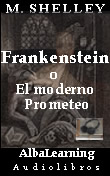 |
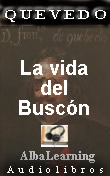 |
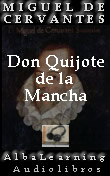 |
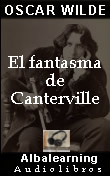 |
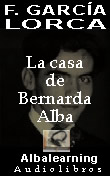 |
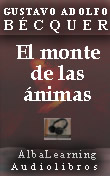 |
 |
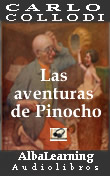 |
|
¿Cómo descargar los audiolibros? Síganos en: |
|
||
|---|---|---|---|
|
©2021 AlbaLearning (All rights reserved) |
|---|